Research capacity building is intrinsic to the work of the Institute for Global Health & Infectious Diseases (IGHID), nurturing emerging scientists through education and training. For UNC medical students and resident physicians interested in global health, the Office of Global Health Education (OGHE) develops programmatic structure, support, and engagement in global medical education, led by Martha Carlough, MD, MPH, Sylvia Becker-Dreps, MD, MPH, Justin Meyers, DO, MPH, and Moira Rogers, PhD. On Sept 12, Global Health Scholars shared their summer research experiences with the community. Following are highlights from this event.
Barriers to Infection Prevention Control Guideline Adherence in Uganda: Grayson Privette
“I got involved in research largely through my interactions with the Infectious Disease Epidemiology and Ecology Lab (IDEEL), working with Dr. Ross Boyce and my research mentor Dr. Emily Ciccone–both with the Division of Infectious Diseases–focused on infection control guideline adherence and acute respiratory illnesses in healthcare settings.
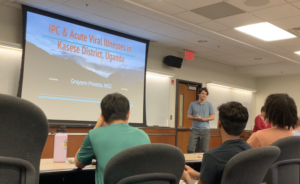
“The idea behind my research project is to identify barriers to infection prevention control guideline adherence in Western Uganda. Uganda, like many countries around the world, have national standards for infection prevention and control (IPC) that are largely based on WHO best-practice guidelines to reduce transmission of infections related to healthcare. However, there are significant infrastructure and resource-related barriers to these best practices across many settings like rural Western Uganda. We wanted to determine how IPC guidelines are practically followed in such settings and determine the best steps forward to reduce the transmission of infections related to healthcare given these very real challenges.
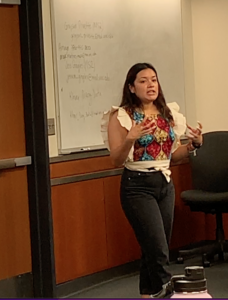
“We decided on a three-pronged approach for the project. We first wanted to do an infrastructure assessment—the physical infrastructure of the building and how it may facilitate or hinder IPC best practices. Second, we wanted to perform an assessment of knowledge, attitudes and practices for healthcare workers to determine current knowledge regarding national guidelines, common barriers to guideline adherence in practice. For instance, do we have issues with our PPE supplies or reliable water availability, and that’s why a guideline couldn’t be followed? These are important barriers to uncover, and something we can highlight for local-, district- and/or national-level health authorities as a potential area for improvement. And lastly but perhaps most importantly, hold focus group discussions to dive into the day-to-day experiences of healthcare workers. This is an opportunity to talk about what they think pose barriers to IPC knowledge, share high-risk daily activities that may put them at risk for infection transmission, and discuss common challenges experienced throughout the course of the COVID-19 pandemic.
“I was also fortunate to be involved in another project as study coordinator involving the assessment and treatment of acute respiratory illnesses in pediatric populations headed by Dr. Ciccone. The standard of care in Uganda is to give antibiotics for pediatric patients meeting acute respiratory illness guidelines for pneumonia, which is largely a clinical judgement given the lack of imaging and diagnostic tools available. A previous pilot study showed that there is a significant proportion of viral causes of acute respiratory illness in this setting, where we know antibiotics aren’t going to do the job. Using PCR, this is an expansion of that pilot project across two sites and several hundred patients to better assess the etiology of the burden of respiratory infections, potential opportunities to reduce antibiotics usage, and also follow up with patients after discharge to determine treatment efficacy and health behaviors.
“Uganda is beautiful, but the people are even more beautiful. I can’t say enough about how supportive staff members were within our research collaboration with Mbarara University of Science and Technology in Uganda, and everyone I’ve worked with has been amazing.
“My biggest lesson learned in global health research is that flexibility is key. I think anyone involved in global health work will agree that you have to be able to change course at a moment’s notice, and a positive attitude is always helpful to maintain momentum in research projects and continue to develop lasting relationships with our research partners. There are of course many barriers to be encountered but it is so much fun to learn new skills in different environments and help to extend UNC’s impact of improving health across the globe.”
Pediatric Healthcare Transition Readiness in Egypt: Peter Said
“I’m originally from Alexandria, Egypt, but Alexandria University was unable to work with me on short notice to conduct my research project. I actually ended up doing my project in Zagazig University which is about three hours away from where I’m from. I moved to the US when I was 12 years old, and although I went back to Egypt on a vacation with family, this was a new experience for me since I have never lived in Egypt as an adult and away from family.
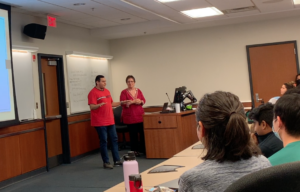
“I talked with Dr. Maria E. Diaz-Gonzalez de Ferris, associate director of the UNC Office of Medical Student Research, who developed a pediatric health care transition readiness questionnaire that was used in the US and Mexico as part of her research. I told her I was from Egypt and was interested in global health and I asked if she’d like to add the Arabic speaking population to her project- she loved that idea. And that’s how it came to be. However, the project came under a couple of conditions. I had to translate and back translate all the surveys to the Arabic language, and I had to find everything on my own in Egypt including a doctor to work with, since Egypt is not currently a partner site with UNC.”
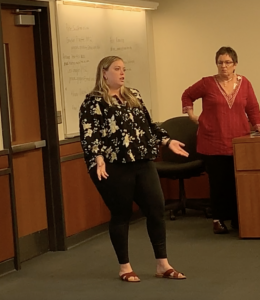
“I was looking at health care transition readiness in adolescents and young adults (AYAs) with chronic diseases. We basically had the survey to assess if they are ready to transfer care from pediatrics to adulthood, and if they can manage their own disease as they become adults. Prior research has shown that if AYAs are well educated on their disease and its management now, the likelihood that they will be successful in managing the disease in the future will be higher and prevent adverse outcomes. Our hypothesis was that Arabic-speaking AYAs will have low health care transition readiness and that they will be in need for disease management education. That’s exactly what we found. What was interesting, however, was the unexpected results from one of the surveys asking about mental health. Collecting data on mental health and wellbeing wasn’t part of the initial plan and was added to the project while in Egypt. However, the data showed that lot of patients and their families were anxious and depressed about their disease and really shed light on how mental health awareness is needed in Egypt.”
“Another lesson learned while working on the project in Egypt was having to adapt the workflow as we had to administer the surveys by ourselves as opposed to having the patient filling it out. We had to adapt to meet the patients and the family’s needs.”
“Sometimes the opportunities we envision do not exist, yet if you have an idea or passion for something, don’t be afraid to create that opportunity for yourself.”
Participating in OB/GYN Clinical Research and Direct Healthcare Delivery in Malawi: Jessica Gingles
“My summer experience was in Malawi, a small country in the southeastern region of Africa where UNC has a really great medical and allied health program.”
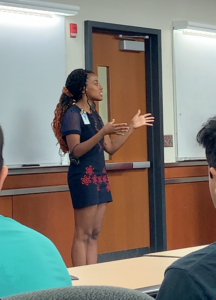
“I participated in both clinical research as well as direct healthcare delivery. In Malawi, you must apply and be approved by the Medical Council of Malawi to participate in human subjects’ research and/or practice medicine as a trained foreign national. Medical students are allowed to apply for funding through the UNC Global Health Office to do so. This support allowed me to round with the obstetrics and gynecology residents at the Ethel Mutharika maternal wing at Kamuzu Central Hospital in Lilongwe.”
“In 2012, it became law that all women had to give birth under the care of a licensed medical professional at a health facility, and so being able to help facilitate safe births was both really rewarding and challenging. On the other side of my project, research focused on evaluating the efficacy of thermal ablation as a method to treat precancerous cervical lesions among cisgendered women, using a same day screen-and-treat model.”
“In 2016, Malawi reportedly had one of the highest, if not the highest rates of cervical cancer in the world. I participated in a study basically looking at preexisting HIV infection as a potential determinant of treatment success. There is high prevalence of both HIV and HPV infections in this region and having HIV may make it harder to clear an HPV infection, further increasing a person’s risk of developing cervical cancer. Therefore, this was an important investigative question.
“It was really fascinating for me, going Monday through Wednesday to village health centers and secondary hospitals in urban and rural areas in the Lilongwe district of Malawi. Then on Thursdays and Fridays, I was in the main tertiary hospital. It was fantastic as a medical student researcher to be able to get two distinct views of outpatient and inpatient care. This experience enabled me to better understand the nature of rural, village-based care and the needs of those patients arriving at the main hospital.”
Learn more from the Office of Global Health Education.
